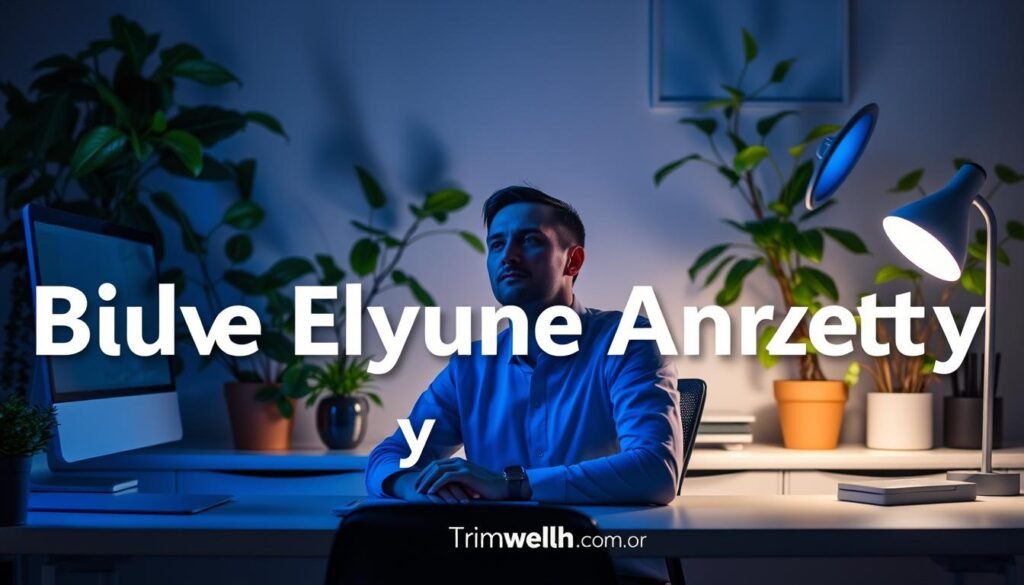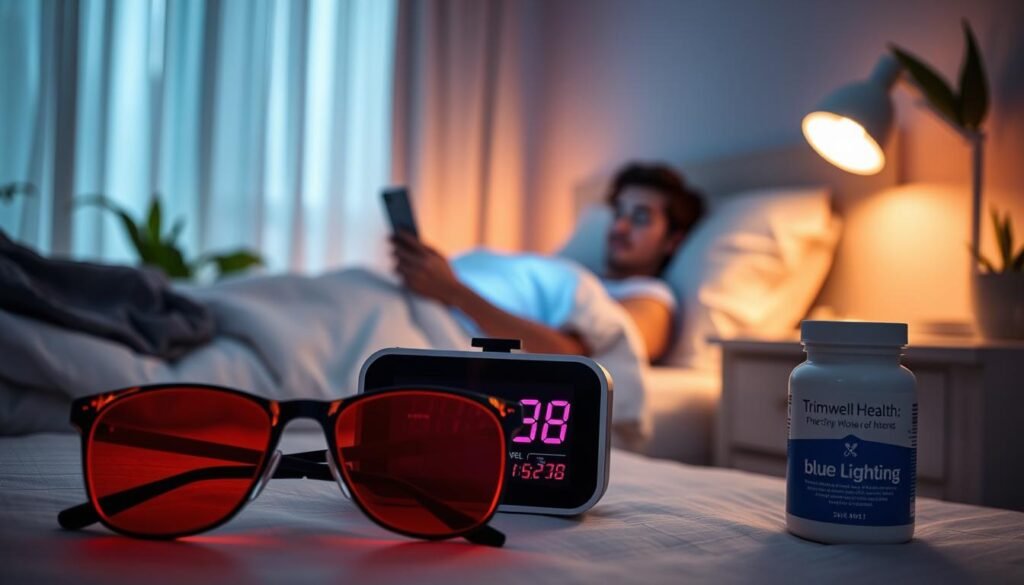How Blue Light Affects Your Anxiety Levels
Imagine ending a long day at work. You scroll through your social media on your phone while relaxing on the sofa. The bright screen lights up your room, but do you know it’s affecting your mind?
Our lives are now more connected to technology. This means we’re exposed to blue light more often. Studies show a link between blue light and feeling more anxious. We’ll look into how blue light affects our feelings, the science behind it, and ways to handle anxiety caused by it.
Key Takeaways
- Exposure to blue light can impact anxiety levels.
- Modern lifestyles increase the amount of blue light individuals encounter.
- Understanding the effects of blue light is key for mental health.
- Managing blue light exposure can ease anxiety symptoms.
- Research links blue light to mood disorders.
Understanding Blue Light and Its Sources
Blue light is all around us and affects our health. It’s a high-energy light with short waves. It can change how we feel and sleep.
Definition of Blue Light
Blue light is light with a wavelength of 380 to 500 nanometers. It can mess with our sleep and mood. It’s linked to anxiety too.
Common Sources of Blue Light
Many things in our lives give off blue light. Here are some:
- Smartphones and tablets
- Computer screens and laptops
- Televisions
- LED and fluorescent lighting
We’re always around artificial light now. This can affect our mental health, like causing anxiety.
How Blue Light Affects Your Anxiety Levels
Many people don’t know how much blue light affects anxiety. Light is key to our mood. Studies show blue light’s big role in mood changes. Knowing this helps us fight anxiety better.
The Connection Between Light and Mood
Light can make our brains feel different emotions. Blue light changes how our brain feels, affecting our mood. It does this by affecting our brain’s chemicals and mood.
Research Findings on Blue Light and Anxiety
Many studies have looked at blue light and anxiety. They found blue light at night makes us feel stressed and anxious. People who use screens a lot often feel more anxious. This shows how important it is to watch our light use.
The Circadian Rhythm and Blue Light Exposure
The circadian rhythm and blue light exposure affect sleep and hormones. Our internal clock, the circadian rhythm, controls when we sleep and wake. Blue light from screens can mess with this clock, causing bad sleep and anxiety.
Impact on Sleep Patterns
In the evening, our body gets ready for sleep by making more melatonin. But blue light stops melatonin production. This makes it hard to fall and stay asleep.
This sleep problem leads to feeling tired and cranky. It can make anxiety worse too.
Hormonal Changes Induced by Blue Light
Blue light changes our hormones a lot. It stops melatonin production, which affects sleep. It also raises cortisol levels, which is linked to stress.
High cortisol makes us feel anxious. This anxiety can mess with our sleep and mental health even more.
Effects of Blue Light on Hormones Related to Stress
Blue light affects hormones that help us deal with stress. Studies show it raises cortisol levels. Cortisol is called the stress hormone.
It helps our body react to stress. Blue light also messes with adrenaline levels. This mix can make us feel more anxious and stressed.
How Cortisol and Adrenaline Are Affected
Too much blue light can make cortisol levels go up. This can make us feel more anxious. High cortisol levels also make adrenaline release more.
This can make our heart beat faster and feel urgent. It’s hard to calm down, making anxiety worse.
The Role of Melatonin in Anxiety
Melatonin helps us sleep well. But blue light can mess with our sleep. High cortisol and adrenaline levels can stop melatonin from working right.
This hurts our sleep and makes anxiety worse. Poor sleep can make anxiety even more. It’s a bad cycle for our mental health.
The Vicious Cycle of Anxiety and Sleep Disturbances
Anxiety and sleep problems are closely linked. Bad sleep can make anxiety worse, starting a bad cycle. This cycle is hard to break for those who struggle with it.
Link Between Poor Sleep and Increased Anxiety Levels
Studies show that people with insomnia often feel more anxious. Not sleeping well can make you feel alert and emotional. This can lead to anxiety attacks or make anxiety worse.
Studies on Insomnia and Anxiety Disorders
Research finds that many with insomnia also have anxiety. About 24 to 36% of those with insomnia also have anxiety. It’s important to treat both together for better health.
| Study | Findings |
|---|---|
| Insomnia Research 1 | 24% of insomnia patients showed significant anxiety symptoms. |
| Insomnia Research 2 | 36% of individuals with chronic insomnia meet criteria for anxiety disorders. |
| General Population Study | A strong correlation exists between poor sleep quality and increased anxiety levels. |
Managing Anxiety with Blue Light Awareness
Knowing how blue light affects us is key to managing anxiety. By cutting down on blue light, we can feel calmer. Making small changes in our daily lives can help a lot.
Reducing Blue Light Exposure in Daily Life
Begin by changing your daily habits to reduce blue light. Here are some helpful tips:
- Wear blue light blocking glasses when using screens, mainly at night.
- Turn on night mode on your devices to cut down blue light.
- Try to use screens less before bed to relax.
Strategies for Better Sleep Hygiene
Good sleep habits are important for feeling better. Create a sleep-friendly environment:
- Have a quiet bedtime routine, like reading or relaxing.
- Make your bedroom dark and cool for better sleep.
- Stay away from caffeine and big meals before bed.

Benefits of Blue Light Therapy for Anxiety
Blue light therapy is a new way to help with anxiety. It uses blue light to make us feel better. Many people find it helps with anxiety and depression.
Overview of Blue Light Therapy
Blue light therapy uses light like the sun. It has a special wavelength of about 470nm. This light helps our brain make more serotonin, which makes us feel better.
People who try this therapy say it helps them feel more in control. It also helps with thinking clearly. Using blue light can really help with anxiety, which is great during the cold winter months.
Research Supporting Blue Light Therapy in Reducing Anxiety
Many studies show blue light therapy works for anxiety. It helps us remember things better and think clearer. This can help with anxious thoughts.
Blue light also helps with pain, which is good for our mental health. This research is exciting because it shows blue light can really help us feel better. It’s a new hope for those with anxiety.
Tips for Mitigating the Negative Effects of Blue Light
Steps to fight blue light can make you feel better. This is true if you’re on screens a lot. Use blue light blocking solutions and start a calming evening routine.
Blue Light Blocking Glasses
Blue light glasses are a great way to protect your eyes. They block harmful blue light and help you focus. They also reduce eye strain.
Wear them in the evening to relax better. Choose glasses that are stylish and work well.
Creating a Calming Evening Routine
Start a calming evening routine to fight blue light. Cut down on screen time an hour before bed. Read, meditate, or take a warm bath.
These activities tell your body it’s time to sleep. They help you sleep better and feel less anxious. Add soft lights or candles for a peaceful feel.

Conclusion
Blue light and anxiety are linked in a complex way. It’s important to know how screens and lights affect our minds. This knowledge helps us make better choices for our health.
Reducing blue light and getting better sleep are key to good mental health. Light, sleep, and hormones all affect how we feel. We need more research to find ways to lessen blue light’s bad effects.
By controlling blue light, we can sleep better and feel better mentally. Remember, being aware of our surroundings helps us live better lives.
FAQ
What is blue light?
Blue light is a high-energy, short wavelength light. It’s in the visible light spectrum. It comes from devices like phones, computers, and TVs. It also comes from LED bulbs.
How does blue light exposure affect anxiety levels?
Blue light can change your mood. It might make you feel more anxious. Being on screens for too long can make you feel stressed and anxious.
Can blue light disrupt my sleep?
Yes, it can. Blue light messes with your body clock. It can stop melatonin production. This can cause insomnia and make anxiety worse.
What hormonal changes occur due to blue light exposure?
Blue light raises cortisol and adrenaline. These are stress hormones. It also lowers melatonin, which helps you sleep.
How are anxiety and sleep disorders related?
Poor sleep and anxiety are closely linked. People with insomnia often have anxiety too. Many with insomnia feel very anxious.
What are some practical strategies for reducing blue light exposure?
Use blue light blocking glasses. Change your device settings to reduce blue light. Also, get to bed earlier and avoid screens before sleep.
What is blue light therapy, and how can it help with anxiety?
Blue light therapy uses blue light to help your mood. It can make you feel better and think clearer. It’s being studied for anxiety and depression.
Are there tips for creating a calming evening routine?
Yes, there are. A calm evening routine can help you sleep better and feel less anxious. Try reading, meditating, or relaxing before bed. Avoid screens.


